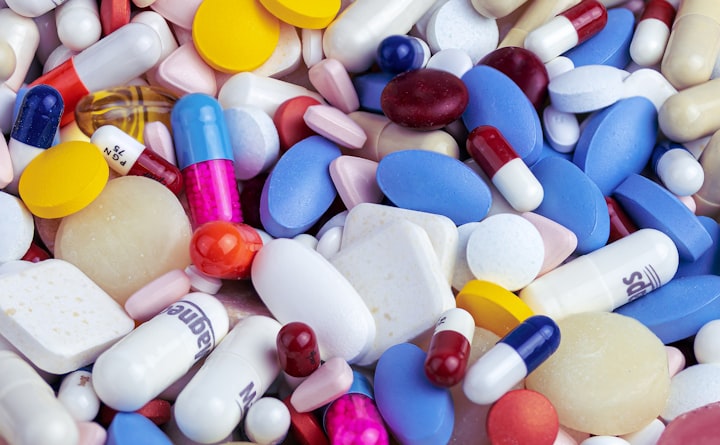The Importance of Responsible Self-Medication
How to handle medical issues at home

Self-medication can provide relief for minor ailments, but it's crucial to exercise caution and responsibility. In this blog post, we will explore the key aspects of self-medication, emphasizing when to refer to a healthcare professional, optimal usage of antibiotics and insulin, essential medications for every household, and the consequences of taking expired drugs. By understanding these factors, we can make informed decisions regarding our health and well-being.
"Inspired by home doctor a book written by Dr. Maybell Nieves"
I. Understanding Self-Medication:
Self-medication refers to the practice of using over-the-counter (OTC) drugs or previously prescribed medications to treat common health issues. While it can be effective, it's vital to consider certain guidelines to ensure safety and effectiveness. Here are a few key points to keep in mind:
Proper Diagnosis: Accurate self-diagnosis is crucial before resorting to self-medication. It's essential to differentiate between minor ailments that can be self-treated and more serious conditions that require professional medical attention.
Knowledge of Medications: Understand the purpose, dosage, possible side effects, and contraindications of the medications you intend to use. Read the labels, package inserts, and consult reputable sources.
Adherence to Recommended Dosages: Follow the recommended dosages and frequency of use as indicated on the packaging or as advised by a healthcare professional.
II. When to Refer to a Doctor:
While self-medication can address many minor health issues, some situations warrant medical intervention. Here are a few scenarios in which you should promptly seek medical advice:
Severe or Prolonged Symptoms: If your symptoms worsen or persist despite self-treatment, it's crucial to consult a healthcare professional. They can assess your condition and provide appropriate medical guidance.
Chronic Conditions: Individuals with chronic diseases like diabetes, hypertension, or asthma should consult a doctor before self-medicating. Proper management of these conditions requires professional input.
Medication Interactions: If you are already taking prescribed medications, it's essential to consult a healthcare professional before adding any new OTC drugs. Some medications can interact negatively, compromising effectiveness or causing harmful side effects.
III. Optimal Usage of Antibiotics and Insulin:
Antibiotics and insulin are essential medications that require careful handling and proper usage. Understanding their optimal usage is crucial for effective treatment and preventing the development of antibiotic resistance or complications related to insulin administration.
Antibiotics: These powerful medications are used to treat bacterial infections. To ensure responsible use:
a. Complete the Full Course: Always complete the full prescribed course of antibiotics, even if symptoms improve. Premature discontinuation can result in antibiotic resistance, making future infections harder to treat.
b. Avoid Misuse: Antibiotics should only be used for bacterial infections. They are ineffective against viral infections, such as colds or the flu.
Insulin: For individuals with diabetes, insulin is a lifesaving medication. Here are some considerations for its optimal usage:
a. Proper Administration: Ensure you receive proper training on insulin administration techniques. Incorrect usage can lead to complications like hypoglycemia or hyperglycemia.
b. Regular Monitoring: Regularly monitor blood glucose levels as directed by your healthcare provider. This helps adjust insulin doses for better glycemic control.
IV. Essential Medications for Every Household:
Every household should have a well-stocked medicine cabinet with essential medications to address common health issues. While specific needs may vary, here are some important items to include:
1) Pain Relievers: Over-the-counter pain relievers like acetaminophen or ibuprofen can help user alleviate minor aches, pains, and fevers. Ensure to follow the recommended dosages and consult a healthcare professional if symptoms persist or worsen.
2) Antacids and Antidiarrheals: These medications can provide relief from heartburn, indigestion, and mild diarrhea. They help manage temporary gastrointestinal discomfort but should not be used for chronic conditions. If symptoms persist, consult a doctor.
3) Allergy Medications: Antihistamines can help alleviate symptoms of allergies, such as sneezing, itching, and nasal congestion. However, if symptoms are severe or persistent, it's important to consult a healthcare professional for a proper diagnosis and long-term management.
4) First Aid Supplies: A well-stocked first aid kit should include items like adhesive bandages, sterile gauze, antiseptic solution, and tweezers. These supplies can be used to clean and dress minor cuts, scrapes, and burns.
5) Thermometer: A reliable thermometer is essential for monitoring body temperature. It helps determine if a fever is present, which can indicate an underlying infection or illness.
6) Prescription Medications: If you or a family member requires regular prescription medications, ensure an adequate supply is available and stored appropriately. It's important to follow the prescribed dosage and consult a healthcare professional for any concerns or necessary adjustments.
V. Expired Medications: Understanding the Risks:
Expired medications may lose their effectiveness or even pose risks to your health. Here's what happens when you take expired drugs:
Reduced Effectiveness: Over time, active ingredients in medications may break down, reducing their potency. This can result in suboptimal treatment and inadequate symptom relief.
Chemical Degradation: Expired medications can undergo chemical changes that produce harmful byproducts. Ingesting such substances may lead to adverse reactions or toxicity.
Altered Formulations: Some medications, such as liquid suspensions or eye drops, may undergo physical changes over time. This can impact their consistency, making them less effective or potentially harmful.
To ensure safe medication use:
a. Check Expiration Dates: Regularly inspect your medicine cabinet for expired medications. Dispose of them properly and replace them with fresh supplies as needed.
b. Proper Disposal: Do not flush medications down the toilet or throw them in the trash. Instead, follow local guidelines for safe medication disposal, such as using drug take-back programs or designated collection sites.
c. Consult a Healthcare Professional: If you have questions about the effectiveness or safety of expired medications, consult a pharmacist or healthcare professional for guidance.
Conclusion:
Self-medication can provide relief for minor ailments, but responsible practices are essential to ensure safety and effectiveness. Knowing when to refer to a healthcare professional, understanding optimal usage of antibiotics and insulin, keeping essential medications at home, and avoiding expired drugs are key factors in maintaining our well-being. By staying informed and making educated decisions, we can effectively manage common health issues while prioritizing our long-term health. Remember, when in doubt, always consult a healthcare professional for proper guidance and care.
Unlock the secrets to responsible self-medication with "Home Doctor," written by Dr. Maybell Nieves and approved by other doctors to be your comprehensive guide to taking charge of your health. Empower yourself with knowledge, gain confidence, and save time and money on unnecessary doctor visits - claim your copy now and become your family's trusted home doctor! as well as gaining the knowledge to use home and natural remedies to releave health conditions and the identification of symptoms of different medical emergencies such as Strok and heart attacks.
About the Creator
Hassan Mohamed
Helping people make money online and gaining financial freedom





Comments
There are no comments for this story
Be the first to respond and start the conversation.